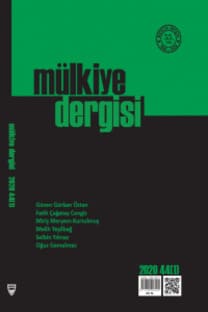Bahreyn’de arap kışı: Şiilerin demokrasi mücadelesi
Arapça’da iki deniz arasındaki ada anlamına gelen Bahreyn, günümüzde Basra Körfezi’ndeki mezhepsel çatışmanın odağında olan bir ülke olarak öne çıkmaktadır. Ülkenin yönetici elitleri olan Sünniler ile Şii halk arasında yaşanan gerginlikler 2011 Şubatında yeni bir çatışmanın yaşanmasına yol açmıştır. Bahreyn’deki mezhepsel çatışmalara bir milad vermek gerekirse, dönemin Katar Emiri olan El Halife ailesinin 1782-83’lerde nüfusu Şii Araplardan oluşan Bahreyn’de İran etkisini ortadan kaldırarak ülkeyi denetimleri altına almasıyla başlatılabilir. 1820’de İngilizlerle yapılan koruma anlaşmasını 1861 ve 1868 diğer koruma anlaşmaları izlemiş ve böylelikle Halife ailesinin Şii çoğunluk karşısında iktidarını koruması dönemin İngiltere’si açısından temel güvenlik politikaları olmuştur. Bununla birlikte İngiliz etkisi döneminde Bahreynli Şiilerin siyasal, idari ve ekonomik alanda temsili konusunda günümüzle karşılaştırıldığında başarılı politikaların hayata geçirildiğini belirtmek gerekir. Bahryen’in bağımsızlığını kazandığı 1971 sonrası dönemde ise El Halife yönetimi Şiilerin toplumsal ve siyasal alandaki etkisini sınırlandırma girişimlerinde bulunmuş ve bunun bir sonucu olarak da 1980’lerden başlayarak günümüze dek gelen bir Şii muhalefet hareketiyle mücadele etmek zorunda kalmıştır. Dolayısıyla 2011 yılında tüm Arap dünyasında etkili olmaya başlayan Arap Baharının Bahreyn’deki anlamı Şiilerin siyasal, iktisadi ve idari alanda Sünnilerle eşit temsilini sağlayacak anayasal değişiklikleri sağlamak olarak değerlendirilmektedir.
Arab winter in bahrain: Shia strugle for demokracy
Today the name of Bahrain, which means island between two seas in Arabic, comes to forefront as a country which is at the centre of secterian tensions in the Persian Gulf. The tension, which took place between the Sunni being the ruling elites of the country and the Shia people, led to a new conflict in February 2011. The sectarian tensions in Bahrain could have started upon the fact that the Al Khalifa family being the then Qatari Emir eliminated the influence of Iran in Bahrain, whose population between the years 1782 and 1783 was composed of the Shia Arabs, and that they brought the country under control. The protection agreement signed with the English in 1820 was followed by the other protection agreements in 1861 and 1868, and thus the fact that the Khalifa family kept its power against the Shia majority became the main security policies for the then England. In addition to this, when the political, administrative and economic representation of the Bahraini Shia during the English influence period is compared with today, it is necessary to indicate that the successful policies were put into practice. As for the post-1971 period, when Bahrain gained its independence, the Al Khalifa administration made initiatives to limit the influence of the Shia in social and political fields; and as a result, it had to struggle with the Shia opposition movement, which started in 1980’s and still exists today. Therefore, the meaning of the Arab Spring, which started to be effective across the whole Arab world in 2011, in Bahrain has been assessed as providing the Constitutional amendments, which would enable the equal representation of the Shia with the Sunni in political, economic, and administrative fields.
___
- Albaharna, Husain M. (1968). The Legal Status of the Arabian Gulf States: A Study of Their Treaty, Great Britain: University of Manchester pub.
- Al Arabiya News, “GCC Troops Dispatched to Bahrain to Maintain Order”, 14 March 2011, http://www. alarabiya.net/articles/2011/03/14/141445.html, (e.t. 20.03.2011)
- Al-Jamri, Mansoor (2010), “Shia and the State in Bahrain: Integration and Tension”, Alternative Politics, Cilt 2, Özel Sayı 1, ss. 1-24
- Al Jamri, Mansoor. Mülakat, 22.01.2009, Manama, Bahreyn.
- Al Maawdah, Adel bin A. Rahman. Mülakat, 22.01.2009, Manama, Bahreyn.Bahrain Freedom News, “Bahrain Jails 33 More for Protesting”, http://bahrainfreedom.org/NEWS/NewsContent/tabid/69/ ArticleId/867/Bahrain-jails-33-more-for-protesting.aspx, (e.t. 6.10.2011)
- Ayhan, Veysel (2010), “Oman Sultanlığı: Arap Yarımadasında Geleneksel ile Modernite Arasında Bir Ülke”, Orta Doğu Stratejik Araştırma Merkezi, Rapor No:16
- Bronner, Ethan “Protesters From Bahrain Square”, The New York Times, March 16, 2011,http://www. nytimes.com/2011/03/17/world/middleeast/17bahrain.html?pagewanted=all (e.t. 28.05.2011)
- Cole, Juan R. I. (1987). “Rival Empires of Trade and Imami Shiism in Eastern Arabia, 1300–1800”, International Journal of Middle East Studies, Vol. 19, No. 2, ss. 177-203.
- Crystal, Jill (1990). Oil and Politics in the Gulf: Rulers and Merchants in Kuwait and Qatar, New York: Cambridge University Pub.
- Gulf Centre for Democratic Development (GCDD), Al Bander Report: Demographic Engineering and Mechanisms of Exclusion, Bahreyn: September 2006.
- Kurşun, Zekeriya (1998). Necid ve Ahsa’da Osmanlı Hâkimiyeti: Vehhabî Hareketi ve Suud Devleti’nin Ortaya Çıkışı, Ankara: Türk Tarih Kurumu Yay.
- Muslim Brotherhood’s Official English Web Site “Interview With Leader of Bahrain’s Al-Menbar Society”, http://www.ikhwanweb.com/article.php?id=2264, (e.t. 10.10.2011).
- National Portal of the Kingdom of Bahrain Website, “Constitution of the Kingdom of Bahrain”, 14 February 2002,
- http://www.bah rain.bh /pubpor tal /w ps/wcm /con nect /66637e004b96f 314ba75bf 13d8048f 0c/ CA9SS7XP.pdf?MOD=AJPERES&CACHEID=66637e004b96f314ba75bf13d8048f0c, (e.t. 03.04.2011).
- Press News, “Over 80% of Bahrainis Refused to Vote,” 25.09.2011.
- Press News, “Bahrainis Go on Major Hunger Strike”, http://www.presstv.ir/detail/203443.html , (e.t. 8.10.2011)
- Programme on Governance in the Arab Region (POGAR), “Bahrain National Action Charter, 2001”, http://www.pogar.org/publications/other/constitutions/bahrain-charter-01e.pdf, (e.t. 25.08.2011).
- Rihani, Ameen Fares (1930). Around the Coasts of Arabia, Houghton Mifflin Company,
- Secretary-General SG/SM/13856, “Secretary General, Concerned About Harsh Sentences, Lack of Due Process Calls for Release of Political Prisoners in Bahrain”, 30 Sep., 2011, http://www.un.org/News/ Press/docs/2011/sgsm13856.doc.htm
- Sotloff, Steven “Why Bahrain’s Shiite Majority is Restless Despite Election Gains”, CS Monitor News, http://www.csmonitor.com/World/Middle-East/2010/1026/Why-Bahrain-s-Shiite-majority-is-restlessdespite-election-gains (e.t. 12.05.2011)
- The Bahrain Center for Human Rights (BCHR), “As a Result of Crackdown on Protest in Bahrain”, (e.t. 11.10.2011)
- Zahlan, Rosemarie Said (1989). The Making of the Modern Gulf States: Kuwait, Bahrain, Qatar, the United Arab Emirates and Oman, London: Unwin Hyman,
- Wright, Stewen (2006), “Generational Change and Elite-driven Reforms in the Kingdom of Bahrain”,Sir William Luce Fellowship Paper No:7.
- ISSN: 1305-9971
- Yayın Aralığı: Yılda 4 Sayı
- Başlangıç: 1965
- Yayıncı: Mülkiyeliler Birliği Genel Merkezi
Sayıdaki Diğer Makaleler
1950–1960 Arap devrimleri ve 2011 “arap baharı”: Benzerlikler ve farklılıklar
Arap ayaklanmaları: Dönüşümü etkileyen faktörler
Mustafa Kemal Döneminde Ekonomi -Büyük Devletler ve Türkiye
Orta Doğuyu Ibn Haldunca Anlama Yönünde Bir Not
